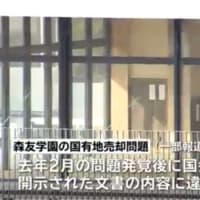

目良 誠二郎さんFBより 2017.3.18
ネット上で出回っているファシズムについての14項目は本来、単にファシズムの「初期症候」としてではなくまさに「ファシズムの特徴」として指摘されたものでした!
そして、それがすべて現在の安倍政権に符合しているのです!!
★イルコモンズ @illcommonz 3月8日
【現代世界論概論】(資料集)
「ファシズムの初期症候 / Early Warning Signs of Fascism(日本語訳版)」(ローレンス・W・ブリット起草/米国・ホロコースト博物館展示パネルより)
30件の返信 2,373件のリツイート 1,706 いいね
イルコモンズ(小田マサノリ)さんがこのツイートで紹介した、「ファシズムの初期症候 / Early Warning Signs of Fascism(日本語訳版)」(写真)の14項目が、ことごとく安倍政権にぴったり当てはまるので、大拡散中ですね。
一見、かなり古そうな写真ですが、(ローレンス・W・ブリット起草/米国・ホロコースト博物館展示パネルより)とあるので、調べてみました。
★"Holocaust Museum poster on ‘warning signs of fascism’ goes viral"
「Sarah Rose posted a photo of an “Early Warning Signs of Fascism” poster to her Twitter timeline early Monday afternoon. As of press time, it had been retweeted 19,000 times and liked by 20,000. The card is a simple list of identifying features of a potentially fascist regime, controversially created by Laurence W. Britt in 2003. It’s now available for sale several places on the web, so it’s not exactly a Holocaust Museum exclusive.」(2015年)
http://healthanddiytips.com/holocaust-museum-poster-warnin…/
ホロコースト博物館の“Early Warning Signs of Fascism”と題された 展示パネル(ポスター)の写真を、2015年にSarah Roseという女性がツイートしたところ、あっという間に大拡散したというのですが、このポスターはネット上でも広く売られているものだとか。
イルコモンズさんのツイートには、「ローレンス・W・ブリット起草」とあるので、さらに調べてみました。
★"The 14 Characteristics of Fascism by Lawrence Britt
Spring 2003 Free Inquiry magazine"
「Political scientist Dr. Lawrence Britt recently wrote an article about fascism ("Fascism Anyone?," Free Inquiry, Spring 2003, page 20). Studying the fascist regimes of Hitler (Germany), Mussolini (Italy), Franco (Spain), Suharto (Indonesia), and Pinochet (Chile), Dr. Britt found they all had 14 elements in common. He calls these the identifying characteristics of fascism. The excerpt is in accordance with the magazine's policy.」
https://ratical.org/ratville/CAH/fasci14chars.html
つまり、“Early Warning Signs of Fascism”と題されていたホロコースト博物館のポスターなどの出典は、政治学者ローレンス・W・ブリットが2003年に発表した"Fascism Anyone?,"という文章から"The 14 Characteristics of Fascism"と題して引用(抜粋)されたものだというのです。
★"Facism Anyone?"
By Laurence W. Britt, Free Inquiry Magazine, Vol 22 no 2, [15 July 2003], followed by a critique by Chip Berlet of an earlier publication of the article
http://www.hartford-hwp.com/archives/27/076.html
ということは、「ファシズムの初期症候 / Early Warning Signs of Fascism」として出回っている14項目は、ファシズムの単に「初期症候」としてではなく、まさに「ファシズムの特徴」として指摘されたものだったのです。
それがすべて現在の安倍政権に符合しているのです!!
"The 14 Characteristics of Fascism"は、"Facism Anyone?"から前書きや後書き、注などを省略していますが、以下のように14項目すべてに説明が付されています。
ですから、ポスターはこの説明をすべて省略し、表題を“Early Warning Signs of Fascism”に変更(改竄?)したものということになります。
各項目の日本語訳も、必ずしも正確でないところがあるように思います。
1.Powerful and Continuing Nationalism
Fascist regimes tend to make constant use of patriotic mottos, slogans, symbols, songs, and other paraphernalia. Flags are seen everywhere, as are flag symbols on clothing and in public displays.
2.Disdain for the Recognition of Human Rights
Because of fear of enemies and the need for security, the people in fascist regimes are persuaded that human rights can be ignored in certain cases because of "need." The people tend to look the other way or even approve of torture, summary executions, assassinations, long incarcerations of prisoners, etc.
3.Identification of Enemies/Scapegoats as a Unifying Cause
The people are rallied into a unifying patriotic frenzy over the need to eliminate a perceived common threat or foe: racial , ethnic or religious minorities; liberals; communists; socialists, terrorists, etc.
4.Supremacy of the Military
Even when there are widespread domestic problems, the military is given a disproportionate amount of government funding, and the domestic agenda is neglected. Soldiers and military service are glamorized.
5.Rampant Sexism
The governments of fascist nations tend to be almost exclusively male-dominated. Under fascist regimes, traditional gender roles are made more rigid. Opposition to abortion is high, as is homophobia and anti-gay legislation and national policy.
6.Controlled Mass Media
Sometimes to media is directly controlled by the government, but in other cases, the media is indirectly controlled by government regulation, or sympathetic media spokespeople and executives. Censorship, especially in war time, is very common.
7.Obsession with National Security
Fear is used as a motivational tool by the government over the masses.
8.Religion and Government are Intertwined
Governments in fascist nations tend to use the most common religion in the nation as a tool to manipulate public opinion. Religious rhetoric and terminology is common from government leaders, even when the major tenets of the religion are diametrically opposed to the government's policies or actions.
9.Corporate Power is Protected
The industrial and business aristocracy of a fascist nation often are the ones who put the government leaders into power, creating a mutually beneficial business/government relationship and power elite.
10. Labor Power is Suppressed
Because the organizing power of labor is the only real threat to a fascist government, labor unions are either eliminated entirely, or are severely suppressed .
11. Disdain for Intellectuals and the Arts
Fascist nations tend to promote and tolerate open hostility to higher education, and academia. It is not uncommon for professors and other academics to be censored or even arrested. Free expression in the arts is openly attacked, and governments often refuse to fund the arts.
12. Obsession with Crime and Punishment
Under fascist regimes, the police are given almost limitless power to enforce laws. The people are often willing to overlook police abuses and even forego civil liberties in the name of patriotism. There is often a national police force with virtually unlimited power in fascist nations.
13. Rampant Cronyism and Corruption
Fascist regimes almost always are governed by groups of friends and associates who appoint each other to government positions and use governmental power and authority to protect their friends from accountability. It is not uncommon in fascist regimes for national resources and even treasures to be appropriated or even outright stolen by government leaders.
14. Fraudulent Elections
Sometimes elections in fascist nations are a complete sham. Other times elections are manipulated by smear campaigns against or even assassination of opposition candidates, use of legislation to control voting numbers or political district boundaries, and manipulation of the media. Fascist nations also typically use their judiciaries to manipulate or control elections.



















